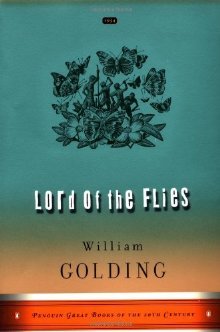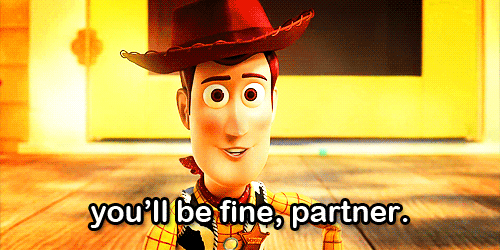Publication: October 1, 1954, by Penguin Books
Genre: Young Adult Fiction, Classics, Death
Pages: 182
Format: Hardcover
Source: Borrowed
Rating:




William Golding's compelling story about a group of very ordinary small boys marooned on a coral island has become a modern classic. At first, it seems as though it's all going to be great fun; but the fun before long becomes furious and life on the island turns into a nightmare of panic and death. As ordinary standards of behavior collapse, the whole world the boys know collapses with them—the world of cricket and homework and adventure stories—and another world is revealed beneath, primitive and terrible. Lord of the Flies remains as provocative today as when it was 1st published in 1954, igniting passionate debate with its startling, brutal portrait of human nature. Though critically acclaimed, it was largely ignored upon its initial publication. Yet soon it became a cult favorite among both students and literary critics who compared it to J.D. Salinger's The Catcher in the Rye in its influence on modern thought and literature. Labeled a parable, an allegory, a myth, a morality tale, a parody, a political treatise, even a vision of the apocalypse, Lord of the Flies has established itself as a classic.Yeah, I can surely tell you that I've never read a book like this. This was eerie, absurd but super-symbolic and written beautifully. Thank goodness I didn't read this on my own or else I would've gotten so confused and absolutely lost in my own mind. Everything would've been a blur and I wouldn't understand what the conch actually represented symbolically.
William Golding's Lord of the Flies is a book that I feel has always been there. It's a classic that's constantly spoken about, whether the person is young or old, and many read it at school since teachers "adore the complications of it." It's also a novel that's imperfect, where the movies were horrible and I feel that nothing is able to showcase it back to its original form. I have mixed feelings with the outcome, but I feel in an overall matter, it's mostly positive, especially looking at the facts that I've never read anything else like it.
Crash-landed on a mysterious island, Ralph, Piggy, Simon and Jack and the choir boys were on a plane heading away from the war when an atom bomb struck the plane and got it to crash. They don't know where they are or who are their acquaintances, but all they know is that they have to survive. At first, things are going pretty smooth compared to later, where animals are killed and the boys go against each other at their own personal war.
The emotion that I felt throughout wasn't like any other that I felt in other books. Some of my friends from school feel that this wasn't a book that's very emotional, but I did shed tears here and there and I wanted to run to some of the boys, and help them and let them know that things eventually would turn out for the better. Golding got us to understand the dark side of humanity, the savage side that every person who has walked the face of the earth has somewhere inside of them, where some can bring it out quicker than others.
"Ralph wept for the end of innocence, the darkness of man's heart, and the fall through the air of the true, wise friend called Piggy."Can you understand that quote if you haven't read the book already? I would predict that you cannot, and I'm secretly high-fiveing you there, my friend. This is such a difficult book to read, and although it's short, I felt that when you read it, you'll need tons of time to analyze it and go through it all with complete understanding. I bet that if I go back and re-read it all over again, I would spot some things that I hadn't the first time. Shocking, right?
I have to say that when I began this, I wasn't all too happy with me having to read it. Until about the sixth chapter, this was pretty boring and I felt that it was just a simple story about many boys trying to survive on a stranded island with hallucinations and paranoia. That's it. Until the sixth chapter, the plot was horrible but the writing was fantastic, and I knew that things would eventually get better but I didn't have high hopes at the same time. After that, HOLY SHIZ.
Yeah, then all of the religious allegorical shit came and we were all left with tears and my teacher even cried and the war-party between Ralph, Jack and Roger came along and I died. I was addicted after that, and I forgot about all of the theoretical symbolic stuff and went on with the storyline and plot because I just couldn't believe what the hell was happening. APOCALYPSE? I do seriously think that that's what Golding was trying to stuff into our minds, people. But in the end, I believe that everyone can have a different opinion on what this book meant to them. To me, it was something like the Stanford University experiment that was taken place in 1971 where people went mental after being put into the situation of authority all around them. It just took a matter of days for the prisoners to begin going mad.
And that's what happened to the boys on the island. They began killing and seeing things. A pig for godssake spoke to them. This isn't fantasy, people, it was a mental illness that everyone seemed to get and they slowly turned barbaric. I believe that if you're put into a situation where your whole life is actually taken away from you before your eyes, your whole sense of civilization is actually able to dissipate in a matter of moments when you don't expect it.
My favourite character? Piggy. Most would say Simon, as he was represented as a Jesus-like figure, and I surely loved him too. But Piggy was someone who actually had his head on his shoulders. Yes, he was unconfident because of Jack, but he knew what he was doing, and I admired him for that. He was hilarious and brought some fun and a sense of humour into the book. Although Ralph hadn't known it by the end, but Piggy was the only one who'd provide him with a real friendship and a connection. Without him, Ralph would've never survived and since Piggy was intelligence and the conch was law, you can't have a government (Ralph) without intelligence and law, right?
Next off, the ending. Yes, I did love it, but it surely was too predictable and cliché. We obviously knew that Ralph and the others would get into a war-like situation and have their lives at stake, but then that happened and they all lived happily ever after. I can't tell you the exact situation, but I expected Golding to add in something more symbolic and suspenseful, though we actually should've known more about the conditions of the war and what their lives turned out to be later. A companion would surely be appreciated by yours truly. Jack and Roger went to an asylum, I'm sure, though.
All in all, although I despited Jack and Roger and had problems with connecting to the plot in the beginning, I was really impressed with the outcome of this classic. You can seriously have a discussion on the themes and meaning with just about anyone, even if they haven't read the book. The message hit me hard, and now I'm really considering to look into more psychological learning stuff, because hey, studying the effects of a ruined civilization and its effects on humans is pretty wicked if you ask me. GEEZ, I'm saying, because this book was messed up, but awesome at the same time. It's really cool to look at stories that authors can come up with, just with a snap of their fingers. Is there more to this than what we see at eye-level? Hah, I'm not sure, but then you'd have to meet up with the Lord of the Flies then, and risk the paranoia.





I really ought to read this sometime.
ReplyDeleteYes! This is absolutely a classic that you can't go without reading.
Delete